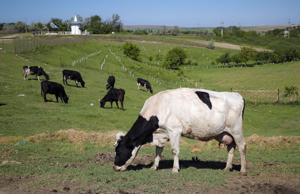
News
October 13, 2025
A recipe for avoiding 15 million deaths a year and climate disaster is fixing food, scientists say
Scientists are presenting new evidence that the worst effects of climate change can’t be avoided without a major transformation of food systems.
**A Recipe for Avoiding 15 Million Deaths a Year and Climate Disaster is Fixing Food, Scientists Say**
The clock is ticking on climate change, and a growing chorus of scientists is pointing to a crucial, often overlooked solution: transforming our global food systems. New research highlights the urgent need for a radical overhaul in how we produce, distribute, and consume food if we hope to avoid the most catastrophic consequences of a warming planet. The message is clear: tackling climate change without fixing our food systems is like trying to bail out a sinking ship with a teaspoon.
The scientific community is increasingly emphasizing that the current state of our food systems is a major contributor to both climate change and global health crises. Industrial agriculture, characterized by deforestation, heavy reliance on fertilizers, and long-distance transportation, generates a significant portion of global greenhouse gas emissions. These emissions contribute to rising temperatures, extreme weather events, and rising sea levels, threatening communities and ecosystems worldwide.
Furthermore, current dietary patterns, heavily reliant on processed foods and unsustainable animal agriculture, are linked to a staggering 15 million deaths annually. These deaths are attributed to diet-related diseases such as heart disease, stroke, type 2 diabetes, and certain cancers. The scientists argue that a shift towards more plant-based diets, coupled with sustainable farming practices, could dramatically reduce both our carbon footprint and the burden of preventable diseases.
The necessary transformation involves a multi-pronged approach. Researchers are advocating for a move away from resource-intensive farming practices towards agroecological methods that prioritize soil health, biodiversity, and reduced reliance on synthetic inputs. They also emphasize the importance of reducing food waste, which accounts for a substantial portion of greenhouse gas emissions. Improved storage, transportation, and consumer education are crucial in minimizing the amount of food that ends up in landfills.
Perhaps most significantly, the scientists are urging a shift towards more sustainable and healthier diets. This includes increasing the consumption of fruits, vegetables, whole grains, and legumes, while reducing the intake of red and processed meats. Such a dietary transition would not only improve public health but also significantly lower the environmental impact of food production.
The challenge is immense, requiring collaboration between governments, businesses, and individuals. Policy changes, technological innovations, and shifts in consumer behavior are all essential to creating a more sustainable and equitable food system. The research underscores that transforming food systems is not just an environmental imperative, but a critical step towards a healthier and more sustainable future for all. The scientists argue that
The clock is ticking on climate change, and a growing chorus of scientists is pointing to a crucial, often overlooked solution: transforming our global food systems. New research highlights the urgent need for a radical overhaul in how we produce, distribute, and consume food if we hope to avoid the most catastrophic consequences of a warming planet. The message is clear: tackling climate change without fixing our food systems is like trying to bail out a sinking ship with a teaspoon.
The scientific community is increasingly emphasizing that the current state of our food systems is a major contributor to both climate change and global health crises. Industrial agriculture, characterized by deforestation, heavy reliance on fertilizers, and long-distance transportation, generates a significant portion of global greenhouse gas emissions. These emissions contribute to rising temperatures, extreme weather events, and rising sea levels, threatening communities and ecosystems worldwide.
Furthermore, current dietary patterns, heavily reliant on processed foods and unsustainable animal agriculture, are linked to a staggering 15 million deaths annually. These deaths are attributed to diet-related diseases such as heart disease, stroke, type 2 diabetes, and certain cancers. The scientists argue that a shift towards more plant-based diets, coupled with sustainable farming practices, could dramatically reduce both our carbon footprint and the burden of preventable diseases.
The necessary transformation involves a multi-pronged approach. Researchers are advocating for a move away from resource-intensive farming practices towards agroecological methods that prioritize soil health, biodiversity, and reduced reliance on synthetic inputs. They also emphasize the importance of reducing food waste, which accounts for a substantial portion of greenhouse gas emissions. Improved storage, transportation, and consumer education are crucial in minimizing the amount of food that ends up in landfills.
Perhaps most significantly, the scientists are urging a shift towards more sustainable and healthier diets. This includes increasing the consumption of fruits, vegetables, whole grains, and legumes, while reducing the intake of red and processed meats. Such a dietary transition would not only improve public health but also significantly lower the environmental impact of food production.
The challenge is immense, requiring collaboration between governments, businesses, and individuals. Policy changes, technological innovations, and shifts in consumer behavior are all essential to creating a more sustainable and equitable food system. The research underscores that transforming food systems is not just an environmental imperative, but a critical step towards a healthier and more sustainable future for all. The scientists argue that
Category:
Entertainment